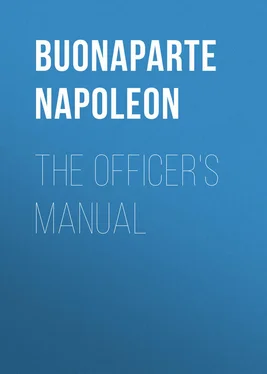Buonaparte Napoleon - The Officer's Manual
Здесь есть возможность читать онлайн «Buonaparte Napoleon - The Officer's Manual» — ознакомительный отрывок электронной книги совершенно бесплатно, а после прочтения отрывка купить полную версию. В некоторых случаях можно слушать аудио, скачать через торрент в формате fb2 и присутствует краткое содержание. Издательство: Иностранный паблик, Жанр: foreign_antique, foreign_prose, Биографии и Мемуары, на английском языке. Описание произведения, (предисловие) а так же отзывы посетителей доступны на портале библиотеки ЛибКат.
- Название:The Officer's Manual
- Автор:
- Издательство:Иностранный паблик
- Жанр:
- Год:неизвестен
- ISBN:нет данных
- Рейтинг книги:5 / 5. Голосов: 1
-
Избранное:Добавить в избранное
- Отзывы:
-
Ваша оценка:
- 100
- 1
- 2
- 3
- 4
- 5
The Officer's Manual: краткое содержание, описание и аннотация
Предлагаем к чтению аннотацию, описание, краткое содержание или предисловие (зависит от того, что написал сам автор книги «The Officer's Manual»). Если вы не нашли необходимую информацию о книге — напишите в комментариях, мы постараемся отыскать её.
The Officer's Manual — читать онлайн ознакомительный отрывок
Ниже представлен текст книги, разбитый по страницам. Система сохранения места последней прочитанной страницы, позволяет с удобством читать онлайн бесплатно книгу «The Officer's Manual», без необходимости каждый раз заново искать на чём Вы остановились. Поставьте закладку, и сможете в любой момент перейти на страницу, на которой закончили чтение.
Интервал:
Закладка:
3. The principal object of a general-in-chief, in the moment of battle, should be to secure the flanks of his army. It is true that natural positions may be found to effect this object, but these positions being fixed and immovable in themselves, they are only advantageous to a general who wishes to wait the shock of the enemy, and not to one who marches to the attack.
A general can, therefore, rely only on the proper arrangement of his troops, to enable him to repel any attempt the adversary may make upon the front, or flanks, or rear of his army.
If one flank of an army rests upon a river, or an impassable ravine, the whole of the cavalry may be posted with the other wing, in order to envelop the enemy more easily by its superiority in numbers.
If the enemy has his flanks supported by woods, light cavalry or infantry should be despatched to attack him in flank or in rear during the heat of the battle. If practicable, also, an attack should be made upon the baggage, to add to his confusion.
If you desire to beat the enemy’s left with your right wing, or his right with your left wing, the wing with which you attack should be reinforced by the élite of your army. At the same moment, the other wing should avoid battle, and the attacking wing brought rapidly forward, so as to overwhelm the enemy. If the nature of the ground admits, he should be approached by stealth, and attacked before he is on his guard. If any signs of fear are discoverable in the enemy, and which are always to be detected by confusion or disorder in his movements, he should be pursued immediately, without allowing him time to recover himself. It is now the cavalry should be brought into action, and manœuvre so as to surprise and cut off his artillery and baggage.
4. The order of march should always be subservient to the order of battle, which last should be arranged beforehand. The march of an army is always well regulated when it is governed by the distance to be accomplished, and by the time required for its performance. The front of the column of march should be diminished or increased according to the nature of the country, taking care that the artillery always proceeds by the main road.
When a river is to be passed, the artillery should be placed in battery upon the bank opposite the point of crossing.
It is a great advantage, when a river forms a sweep or angle, and when a ford is to be found near the place where you wish to effect a passage. As the construction of the bridge proceeds, infantry should be advanced to cover the workmen, by keeping up a fire on the opposite bank; but the moment it is finished, a corps of infantry and cavalry, and some field-pieces, should be pushed across. The infantry should entrench itself immediately at the head of the bridge, and it is prudent, moreover, to fortify on the same side of the river, in order to protect the bridge in case the enemy should venture an offensive movement.
The advanced guard of an army should be always provided with trusty guides, and with a corps of pioneers: the first to point out the best roads, the second to render these roads more practicable.
If the army marches in detachments, the commander of each detachment should be furnished with the name of the place in writing, where the whole are to be reassembled; the place should be sufficiently removed from the enemy to prevent him from occupying it before the junction of all the detachments. To this end, it is of importance to keep the name a secret.
From the moment an army approaches the enemy, it should march in the order in which it is intended to fight. If anything is to be apprehended, precautions are necessary in proportion to the degree of the danger. When a defile is to be passed, the troops should be halted beyond the extremity, until the whole army has quitted the defile.
In order to conceal the movements of an army, it is necessary to march by night through woods and valleys, by the most retired roads, and out of reach of all inhabited places. No fires should be allowed; and, to favor the design still more, the troops should move by verbal order. When the object of the march is to carry a post, or to relieve a place that is besieged, the advanced guard should march within musket shot of the main body, because then you are prepared for an immediate attack, and ready to overthrow all before you.
When a march is made to force a pass guarded by the enemy, it is desirable to make a feint upon one point, while, by a rapid movement, you bring your real attack to bear upon another.
Sometimes success is obtained by pretending to fall back upon the original line of march, and, by a sudden countermarch, seizing upon the pass, before the enemy is able to reoccupy it. Some generals have gained their point by manœuvring so as to deceive the enemy, while a detachment under the cover of high grounds has surprised the passage by a stolen march. The enemy being engaged in watching the movements of the main body, the detachment has an opportunity of entrenching itself in its new position.
5. An army regulates its mode of encampment according to the greater or less degree of precaution, when circumstances require. In a friendly country the troops are divided, to afford better accommodation and supplies. But with the enemy in front, an army should always encamp in order of battle. With this view, it is of the highest importance to cover one part of the camp, as far as practicable, by natural defences, such as a river, a chain of rocks, or a ravine. Care should be taken also that the camp is not commanded, and that there is no obstacle to a free communication between the different corps, and which can prevent the troops from mutually succoring each other.
When an army occupies a fixed camp, it is necessary to be well supplied with provisions and ammunition, or at least that these should be within certain reach and easily obtained. To insure this, the line of communication must be well established, and care taken not to leave an enemy’s fortress in your rear.
When an army is established in winter quarters, its safety is best secured either by fortifying a camp (for which purpose a spot should be selected near a large commercial town, or a river affording facility of transport), or by distributing it in close cantonments, so that the troops should be near together, and capable of affording each other mutual support.
The winter quarters of an army should be protected, likewise, by constructing small covered works on all the lines of approach to the cantonments, and by posting advanced guards of cavalry to observe the motions of the enemy.
6. A battle is to be sought, when there is reason to hope for victory, or when an army runs the risk of being ruined without fighting; also when a besieged place is to be relieved, or when you desire to prevent a reinforcement from reaching the enemy. Battles are useful, likewise, when we wish to profit by a favorable opportunity which offers, to secure a certain advantage, such as seizing upon an undefended point or pass, attacking the enemy when he has committed a fault, or when some misunderstanding among his generals favors the undertaking.
If an enemy declines an engagement, he may be compelled to it, either by besieging a place of importance, or by falling upon him unawares, and when he cannot easily effect his retreat. Or (after pretending to retire), by making a rapid countermarch, attacking him vigorously and forcing him to action.
The different circumstances under which a battle should be avoided or declined, are, when there is greater danger to be apprehended from defeat than advantage to be derived from victory; when you are very inferior to your adversary in numbers, and are expecting reinforcements; above all, when the enemy is advantageously posted, or when he is contributing to his own ruin by some inherent defect in his position, or by the errors and divisions of his generals.
Читать дальшеИнтервал:
Закладка:
Похожие книги на «The Officer's Manual»
Представляем Вашему вниманию похожие книги на «The Officer's Manual» списком для выбора. Мы отобрали схожую по названию и смыслу литературу в надежде предоставить читателям больше вариантов отыскать новые, интересные, ещё непрочитанные произведения.
Обсуждение, отзывы о книге «The Officer's Manual» и просто собственные мнения читателей. Оставьте ваши комментарии, напишите, что Вы думаете о произведении, его смысле или главных героях. Укажите что конкретно понравилось, а что нет, и почему Вы так считаете.












